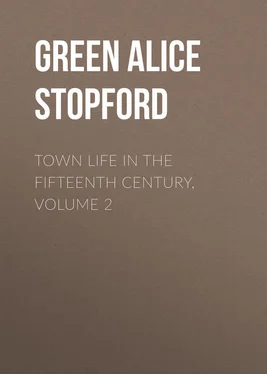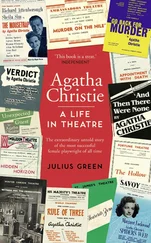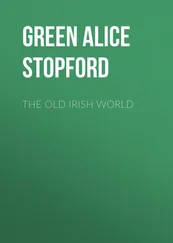Alice Green - Town Life in the Fifteenth Century, Volume 2
Здесь есть возможность читать онлайн «Alice Green - Town Life in the Fifteenth Century, Volume 2» — ознакомительный отрывок электронной книги совершенно бесплатно, а после прочтения отрывка купить полную версию. В некоторых случаях можно слушать аудио, скачать через торрент в формате fb2 и присутствует краткое содержание. Жанр: literature_19, foreign_antique, foreign_prose, Историческая проза, на английском языке. Описание произведения, (предисловие) а так же отзывы посетителей доступны на портале библиотеки ЛибКат.
- Название:Town Life in the Fifteenth Century, Volume 2
- Автор:
- Жанр:
- Год:неизвестен
- ISBN:нет данных
- Рейтинг книги:5 / 5. Голосов: 1
-
Избранное:Добавить в избранное
- Отзывы:
-
Ваша оценка:
- 100
- 1
- 2
- 3
- 4
- 5
Town Life in the Fifteenth Century, Volume 2: краткое содержание, описание и аннотация
Предлагаем к чтению аннотацию, описание, краткое содержание или предисловие (зависит от того, что написал сам автор книги «Town Life in the Fifteenth Century, Volume 2»). Если вы не нашли необходимую информацию о книге — напишите в комментариях, мы постараемся отыскать её.
Town Life in the Fifteenth Century, Volume 2 — читать онлайн ознакомительный отрывок
Ниже представлен текст книги, разбитый по страницам. Система сохранения места последней прочитанной страницы, позволяет с удобством читать онлайн бесплатно книгу «Town Life in the Fifteenth Century, Volume 2», без необходимости каждый раз заново искать на чём Вы остановились. Поставьте закладку, и сможете в любой момент перейти на страницу, на которой закончили чтение.
Интервал:
Закладка:
The new movement marked the beginning of that revolution which was ultimately to take education out of the exclusive control of the Church and hand it over to the people themselves. Up to this time the privileges and profits of teaching had been practically a monopoly of the clergy, and there was no possible competition save that which might spring up between licensed and unlicensed teachers within the ecclesiastical order. [31] The author of Piers Ploughman criticizes the education given by the clerics of his day. “Grammar that ground is of all” was neglected so that no one could now either “versify fair” or construe what the poets wrote. “Doctors of degree and of divinity masters That should the seven arts conne and assoil ad quodlibet , But they fail in philosophy, an philosophers lived And would well examine them, wonder me thinketh!” – Passus xviii. 107-118.
A document drawn up by order of the abbot of Walden tells how the clergy of the parish church there had taught some children of the village the alphabet, and even more advanced lessons, without leave from the abbot, who claimed by the statutes and customs of the monastery a perpetual monopoly of teaching or licensing schoolmasters. A petition was made by the inhabitants in favour of the priests, and in consequence of this petition the abbot, to the great satisfaction of the townsfolk, graciously allowed that every priest of the Church might (during the goodwill of the abbot and convent) receive one “very little child” of each inhabitant, and might teach the child in “alphabete et graciis” [32] The “alphabet and the humanities” did not imply culture in anything like our sense of the word, nor yet Latin from the literary point of view, but the old ecclesiastical discipline, which included above all things logic , and which ultimately led, if the pupil advanced far enough, to the scholastic philosophy. Thus for example in the Epistolæ obscurorum virorum one of the (priestly) correspondents is made to protest against the introduction of the study of Vergil and other new-fangled writers.
but not in any higher learning; a legal instrument embodying this concession was drawn up by a clerk of the York diocese, and signed with a beautiful notarial monogram which must have cost him the greater part of a day to draw. [33] Hist. MSS. Com. viii. 281-2.
But under the new state of things another element was brought into the controversy. The town itself occasionally became the aggressive party, and took the teaching straight out of the hands of the priest. An order was made at Bridgenorth in 1503 “that there shall no priest keep no school, save only one child to help him to say mass, after that a schoolmaster cometh to town, but that every child to resort to the common school in pain of forfeiting to the chamber of the town twenty shillings of every priest that doeth the contrary.” [34] Hist. MSS. Com. x. part 4, 425-6.
Burghers accustomed to manage their own affairs easily assumed the direction of education, and the control of schools gradually passed from clerical to lay hands and became the charge of the whole community. In Nottingham, where there had been a grammar school before 1382 at which it would seem that a boy’s education cost eightpence a term, [35] Nottingham Records, i. 246, 263.
a new free school was founded in 1512, probably by the widow of a former mayor, and was put directly under the management of the mayor and town council, [36] Ordinances for Dame Agnes Meller’s School, Nott. Rec. iii. 453-6. The Mayor of Chester had the payment of the master at Farneworth, Lancashire. (Hist. MSS. Com. viii. 370.) In Coventry the corporation ( i. e. , the Trinity Guild) paid the master.
and as these apparently proved somewhat negligent in the business the Leet jury constantly interfered in the most officious way in the government of the school and the choice and supervision of its teachers. “It will be a credit,” they said, “to have a good master and a good ussher in one school.” [37] Ibid. iv. 191.
Of the intellectual life of the towns we know scarcely anything, and there is perhaps not much to be known. Scholars naturally drifted away to the Universities or London, and the society of the borough was occupied with other matters than learning. In Nottingham, in spite of the educational zeal of the jury, the first evidence we have of a town clerk who knew enough of the classics to quote a line of Vergil and a line of Horace is in 1534-1545; while it is not till 1587 that we find a clerk who had learned Greek. [38] Nott. Rec., iv. 214.
On the other hand Bristol was evidently a centre of radiant light. An excellent education was given in its school, if we judge from the famous Grocyn, who was brought up there and left the school in 1463; [39] Collectanea (Oxf. Hist. Soc.), ii. 334-6.
and its society was adorned by men of culture and wide intellectual curiosity. William of Worcester, the enquirer after universal knowledge, a man of science who practised medicine and cultivated his garden of herbs, as well as a man of letters, who at forty-three “hath gone to school to a Lombard called Karoll Giles to learn and to be read in poetry or else in French,” and to whom “a good book of French or of poetry” seemed as fine a purchase as “a fair manor,” might be seen in his later days at Bristol, practising the art of annalist, in which character he surveyed the whole town and carefully measured it by paces from end to end. [40] Paston Letters, i. 431. Hunt’s Bristol, 112.
His friend Ricart, town clerk and historian, spent the twenty-seven years of his clerkship in writing his Calendar or Chronicle of 332 leaves in six carefully arranged parts, the first three being devoted to history and the last three to local customs and laws, in which he carried the story of Bristol through 3,000 years from the days of Brut to the reign of Edward the Fourth. [41] Introduction by Miss Toulmin Smith to Ricart’s Calendar. Lives of the Berkeleys, i. 5, 7. Skelton was possibly a native of Norfolk, perhaps of Norwich. Skelton’s Poems, ed. Dyce, I. v. vi.
It was inevitable that the purpose and theory of education should ultimately be modified by the change of masters, as well as by the change of manners, and already fervent reformers like Caxton began to look beyond “the alphabet and humanities” and discuss training in the mysteries of the English tongue itself. Among the “fathers ancient” who should command the reverence of scholars they counted the famous men of their own race and speech – men removed from them by but a generation or two – Chaucer “the father and founder of ornate eloquence,” Lydgate, the maker of “volumes that be large and wide,” and Occleve; and it is touching to see men, on the very eve of the heroic age of English literature, wistfully looking back to the vanished glories of their grandfather days, when, as it seemed to them, all the “fresh flowers” of style had been reaped by this handful of ancient worthies, and “of silver language the great riches” stored away in their treasury, so that the painful toiler who came after in search of “the embalmed tongue and aureate sentence,” could now get it only by piece-meal, or at the most might glean here and there by busy diligence something to show that he had reverently visited the fields of the blest. [42] Caxton’s Book of Courtesy, 33-41. See Manners and Meals, lix. Skelton’s Poems (ed. Dyce), I. 75, 377-9.
The enlightened zeal of the learned indeed had still to wage a long warfare with the pedants of the schools and the barbaric notions of education that governed men’s minds; and the training vouchsafed to the poor boys of the fifteenth century was then and for many a century afterwards a rude and brutal one. [43] Directions not to spare the rod were constant. Manners and Meals, 384. See the poor boy’s complaint, p. 385-6. Tusser’s lines show that the system was not confined to the lower schools. “From Paul’s I went to Eton, sent To learn straightways the Latin phrase; Where fifty-three stripes given to me At once I had, For fault but small, or none at all, It came to pass thus beat I was. See, Udall, see the mercy of thee To me, poor lad!” Erasmus, in his Praise of Folly, singles the schoolmasters out as “a race of men the most miserable, who grow old in penury and filth in their schools — schools did I say? prisons! dungeons! I should have said – among their boys, deafened with din, poisoned by a fetid atmosphere; but thanks to their folly perfectly self-satisfied so long as they can bawl and shout to their terrified boys, and box and beat and flog them, and so indulge in all kinds of ways their cruel disposition.” One such master he tells of who to crush boys’ unruly spirits, and to subdue the wantonness of their age, never took a meal with his flock without making the comedy end in a tragedy. “So at the end of the meal one or another boy was dragged out to be flogged.” Boase’s Oxford, 76-77.
No doubt, too, the trader’s view of education, practical as it was, had a touch of unashamed vulgarity. “To my mind,” says the Capper in the Commonweal, “it made no matter if there were no learned men at all,” for “the devil a whit good do ye with your studies but set men together by the ears;” what men wanted was “to write and read, and learn the languages used in countries about us, that we might write our minds to them and they to us.” Scholars, on the other hand, trembled at the results to civilization and knowledge of the crude ideals of the mere man of business, who if he had his way would “in a short space make this realm empty of wise and politic men, and consequently barbarous, and at the last thrall and subject to other nations; for empire is not so much won and kept by the manhood or force of men as by wisdom and policy, [44] The Commonweal (ed. E. Lamond), 21-23, 30.
which is gotten chiefly by learning.” But whatever were their faults it was in the schools as much as in the council-chamber or shop that the revolution of the next century was being prepared; and the wide-reaching results of the spread of education in town and village were potent factors in the developement of a later England. “The fault is in yourselves, ye noblemen’s sons,” wrote Ascham, “and therefore ye deserve the greater blame, that commonly the meaner men’s children come to be the wisest counsellors and greatest doers in the weighty affairs of this realm.” [45] Manners and Meals, xxiv. Cf. ibid. xxvi. xlv.
Интервал:
Закладка:
Похожие книги на «Town Life in the Fifteenth Century, Volume 2»
Представляем Вашему вниманию похожие книги на «Town Life in the Fifteenth Century, Volume 2» списком для выбора. Мы отобрали схожую по названию и смыслу литературу в надежде предоставить читателям больше вариантов отыскать новые, интересные, ещё непрочитанные произведения.
Обсуждение, отзывы о книге «Town Life in the Fifteenth Century, Volume 2» и просто собственные мнения читателей. Оставьте ваши комментарии, напишите, что Вы думаете о произведении, его смысле или главных героях. Укажите что конкретно понравилось, а что нет, и почему Вы так считаете.












